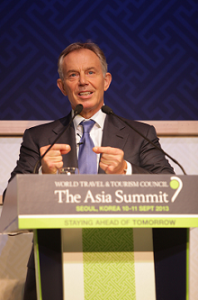WTTC: Blair urge West to compete inbooming global tourism industry

The World Travel & Tourism Council Asia Summit in South Korea today saw former British prime minister Tony Blair and WTTC president David Scowsill join forces to warn western governments not to miss out on the future powerhouse of global wealth creation - tourism.
The two-day summit is looking at how to best exploit the huge projected growth in tourism throughout China, Korea and the wider Pacific region, while urging developed western nations not to miss out by introducing taxes which will lose more money than they generate.
Revealing how Asia’s tourism sector is forecast to grow six per cent per annum over the coming decade, Scowsill said: “It is no accident that we are here today for our first Asia summit.
“Of the 70 million new jobs tourism will stimulate globally by 2023, two thirds – some 47 million - will be in Asia.
“This phenomenal growth will be driven by increasing wealth among Asia’s middle classes, particularly in China.
“The United Nations described it as a historic shift, the likes of which has not been seen for 150 years.
“Asia’s middle class is forecast to triple to 1.7 billion by 2020.”
The need for the West to maintain its market share of the global tourism industry was not lost on Blair.
He said: “As this power shifts to the East, the West is going to have to discover a new partnership with the East.
“The US remains for now the most powerful country but it is likely in time China will become the most powerful country in the world.”
Blair also emphasised the need for all national governments to embrace the tourism industry as a force for good – not just economic growth: “It is an industry that can help bring about more peace and understanding.
“Travel is important because then you see what people have in common.”
Globally, the future continues to look positive with the WTTC predicting three per cent growth this year and generating US$6.8 trillion – nine per cent of global GDP - as well as employing more than 266 million people and accounting for one in every 11 jobs on the planet.

